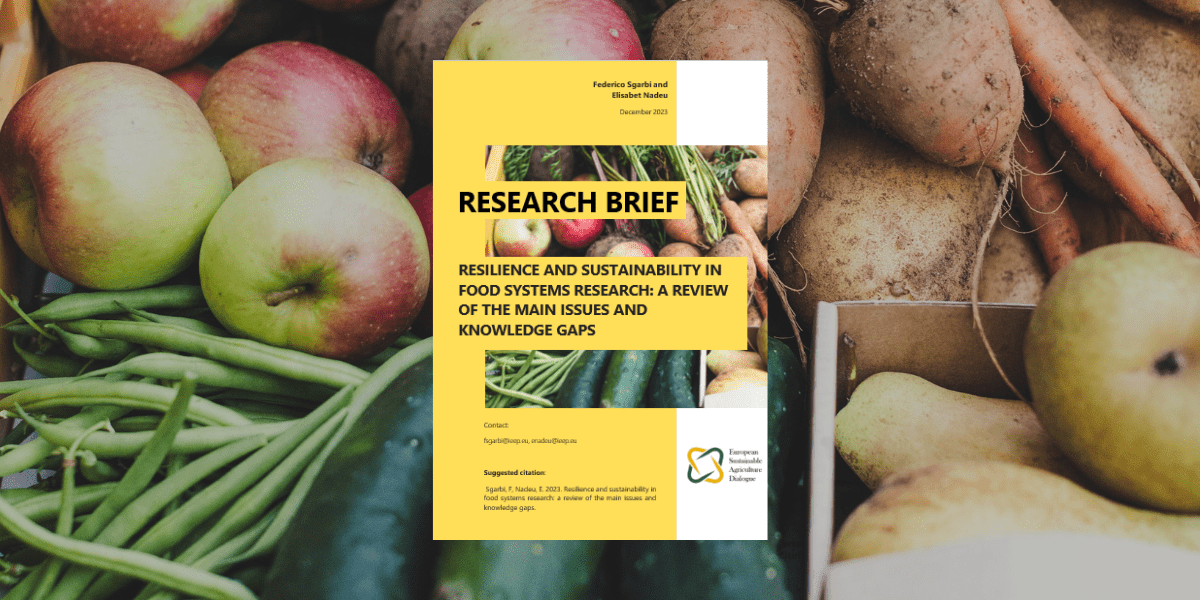Author: Federico Sgarbi, Elisabet Nadeu
Recent crises, such as the COVID 19 pandemic, the Russian invasion of Ukraine and extreme climate events, have added pressure on EU’s food systems’ capacities to deliver while increasing the interest in strengthening their resilience. This brief reviews the approaches used for the study of resilience applied to food systems and its links to sustainability. Identifying the contributing factors to food and farming system resilience can guide decision-making processes towards food system transformation and increased sustainability. The brief closes with a set of recommendations for future research priorities.
Food systems play a central role in our societies, operating across multiple spatial and temporal scales. However, food systems are under pressure due to climate change and challenges linked to the environmental, social and economic dimensions of sustainability. Further investigating the concept of resilience can help build food systems’ capacities to ensure continuous delivery of outcomes in the face of predictable and unpredictable disturbances, which are projected to increase in the future.
This brief reviews the concept of resilience, the approaches used for its study and its links to sustainability. It argues that identifying the factors that contribute to food and farming system resilience can guide decision-making processes that lead to food system transformation towards increased sustainability. However, sustainability norms should be the framework under which resilience operates. Leaving the sustainability framework out can lead to situations in which system resilience is increased (in the short term) at the cost of sustainability, and resilience capacities become lock-ins and barriers to food system transformations.
The brief places the focus on farming systems, which in the EU have evolved towards efficiency and simplicity over time, leading to a reduction in environmental and social resilience. This has been accompanied by a reductionist view of resilience as economic robustness in farming policies, further limiting farmers’ capacity to invest in adaptability and transformability measures that allow for longer-term responses to perturbations. Strategies to increase the resilience of food and farming systems should focus on environmental, economic and social aspects to identify trade-offs and synergies, taking into account different temporal and spatial scales. As the brief shows, resilience, as an intrinsic factor of the transition towards sustainable food systems, can be a powerful tool to identify transformative pathways for various stakeholders operating at different levels and at multiple scales.
EU and global food systems could benefit from additional research on the resilience concept, its applicability to different contexts and links to sustainability. Four main areas for further research are identified in the brief:
- Improving current definitions of concepts and system boundaries, in relation to resilience and its links to sustainability.
- Better characterisation of shocks and stresses that might affect food systems directly and indirectly (both at present and in the future) and establishing metrics and indicators to measure resilience.
- Increasing the understanding of farmers’ perceptions of resilience and the interdependence between resilience capacities.
- Exploring and testing measures and interventions that can strengthen the resilience of food systems, from knowledge exchange to nature-based and technological solutions, following bottom-up and “learning from the future” approaches.
- Understanding the governance processes that can build or hamper food system resilience at different scales, from the farm to the international dimension.
Guiding the food system towards increased sustainability and resilience is a necessary task that will require the engagement of all actors in the food system. Research and innovation funding should ensure that the researched solutions encompass the broadest range of contexts, scales and actors and that today’s responses to increase the resilience of food systems do not compromise their future delivery of desired outcomes.
Read the brief here
The European Sustainable Agriculture Dialogue (ESAD) is a multi-stakeholder platform created in 2019 that brings together various actors from across society – including industry, civil society, universities, and research centres – to discuss key topics, exchange views and standpoints, and recommend research needs to achieve sustainable agriculture.
The brief was developed in consultation with ESAD members and the authors took their inputs into account in the drafting process. The paper does not reflect the views and opinions of single ESAD members. As such, their contribution is not to be interpreted as an endorsement of the final paper.
Photo by Markus Spiske on Unsplash


